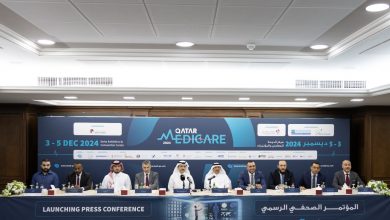MoPH Organizes Workshop for Second Phase of National Blindness, Visual Impairment Survey in Qatar
وزارة الصحة العامة تستعد لتنفيذ المرحلة الثانية للمسح الوطني لضعف الإبصار وأسباب العمى
QNA
Doha: The Ministry of Public Health (MoPH), in collaboration with the World Health Organization (WHO) and the Primary Health Care Corporation (PHCC), organized a training workshop in preparation for the second the Second Phase of National Blindness and Visual Impairment Survey in Qatar, which aims to identify the prevalence of visual impairment and the causes of blindness through the participation of more than 5,000 people aged 50 and older.
The workshop, presented by Dr. Mohammed Mansour, WHO-certified trainer, and consultant ophthalmologist, reviewed the basics and approaches used to implement the survey, with the participation of ophthalmologists and nurses from five PHCC health centers, namely Al Rayyan, Muaither, Al Gharrafa, Airport and Al Wakra Health Centers. A team from the Ministry of Public Health and Dr. Mohammed Mansour carried out field visits to the aforementioned health centers.
Dr. Kholoud Ateeq Al Motawaa, Head of the Non-Communicable Diseases Section at the Ministry of Public Health, said that the workshop aims to enhance the data collection phase, raise the rate of response and greater coverage of residential areas in the State of Qatar to successfully complete the survey target.
Dr. Kholoud Al Motawaa has stressed the importance of research in ophthalmology and the visual sciences, as the National Blindness and Visual Impairment Survey in Qatar will help in implementing eye health and provide the relevant medical sectors with a database needed to Integrate vision and eye health interventions based on scientific evidence.
Dr. Shadi Al Ashwal, an ophthalmologist at the Ministry of Public Health, said that the second phase of the survey will include eye examinations in ten health centers to detect diabetic retinopathy, glaucoma and cataract using the latest version of the data collection and analysis software called RAAB7.
This survey is necessary as it parallels the constant development of ophthalmology. As such, Dr. Shadi Al Ashwal urged the people who will receive a call from MoPH to actively partake in the survey as it will particularly benefit them and benefit the health sector in general. The Ministry of Public Health (MoPH), in collaboration with the World Health Organization (WHO) and the Primary Health Care Corporation (PHCC), organized a training workshop in preparation for the second the Second Phase of National Blindness and Visual Impairment Survey in Qatar, which aims to identify the prevalence of visual impairment and the causes of blindness through the participation of more than 5,000 people aged 50 and older.
The workshop, presented by Dr. Mohammed Mansour, WHO-certified trainer, and consultant ophthalmologist, reviewed the basics and approaches used to implement the survey, with the participation of ophthalmologists and nurses from five PHCC health centers, namely Al Rayyan, Muaither, Al Gharrafa, Airport and Al Wakra Health Centers. A team from the Ministry of Public Health and Dr. Mohammed Mansour carried out field visits to the aforementioned health centers.
Dr. Kholoud Ateeq Al Motawaa, Head of the Non-Communicable Diseases Section at the Ministry of Public Health, said that the workshop aims to enhance the data collection phase, raise the rate of response and greater coverage of residential areas in the State of Qatar to successfully complete the survey target.
Dr. Kholoud Al Motawaa has stressed the importance of research in ophthalmology and the visual sciences, as the National Blindness and Visual Impairment Survey in Qatar will help in implementing eye health and provide the relevant medical sectors with a database needed to Integrate vision and eye health interventions based on scientific evidence.
Dr. Shadi Al Ashwal, an ophthalmologist at the Ministry of Public Health, said that the second phase of the survey will include eye examinations in ten health centers to detect diabetic retinopathy, glaucoma and cataract using the latest version of the data collection and analysis software called RAAB7.
This survey is necessary as it parallels the constant development of ophthalmology. As such, Dr. Shadi Al Ashwal urged the people who will receive a call from MoPH to actively partake in the survey as it will particularly benefit them and benefit the health sector in general.
قنا
الدوحة: تستعد وزارة الصحة العامة لتنفيذ المرحلة الثانية للمسح الوطني لضعف الإبصار وأسباب العمى في دولة قطر.
وتتضمن المرحلة الثانية إجراء فحوصات للعيون في عشرة مراكز صحية، حيث سيتم التقصي عن وجود اعتلال الشبكية السكري ومرض الجلوكوما (المياه الزرقاء) ومرض الساد (المياه البيضاء) باستخدام أحدث الإصدارات لبرنامج ادخال البيانات وتحليلها.
وفي هذا الاطار، نظمت وزارة الصحة العامة، بالتعاون مع منظمة الصحة العالمية ومؤسسة الرعاية الصحية الأولية، ورشة عمل تدريبية حول المرحلة الثانية من المسح الوطني لضعف الإبصار وأسباب العمى في دولة قطر.
ويهدف المسح الوطني إلى تحديد مدى انتشار ضعف الإبصار ومسببات العمى في قطر من خلال مشاركة أكثر من 5 آلاف شخص ممن بلغت أعمارهم خمسين سنة أو أكثر.
واستعرضت الورشة، التي قدمها مدرب معتمد من منظمة الصحة العالمية واستشاري أمراض عيون، الأساسيات والمناهج المتبعة لتطبيق المسح، وذلك بحضور أطباء عيون وممرضين من المراكز الصحية المشاركة بالمسح من مؤسسة الرعاية الصحية الأولية، كما تم تنفيذ زيارات ميدانية إلى المراكز الصحية المشاركة في المسح ضمت فريق عمل من وزارة الصحة العامة ومقدم الورشة.
وفي هذا الصدد، قالت الدكتورة خلود عتيق المطاوعة رئيس قسم الأمراض غير الانتقالية في وزارة الصحة العامة، إن الورشة هدفت إلى تعزيز مرحلة جمع البيانات ورفع مستوى الاستجابة وتغطية أكبر للمناطق السكنية في دولة قطر لاستكمال مراحل المسح بنجاح.
وأكدت أهمية البحوث العلمية في مجال طب العيون بصفة عامة، وأهمية هذا المسح الذي سيساعد في وضع استراتيجيات لتعزيز صحة العيون بدولة قطر وتزويد القطاعات الطبية ذات الصلة بقاعدة بيانات تمكنها من وضع خطط وبرامج صحية متكاملة مبنية على أسس علمية.
من جهته، دعا الدكتور شادي الأشول أخصائي العيون بوزارة الصحة العامة، الأشخاص الذين سيتلقون اتصالا هاتفيا من وزارة الصحة للمشاركة بالمسح إلى إنجاح هذا المشروع الوطني لما فيه من فائدة على المشاركين أنفسهم بصفة خاصة وعلى القطاع الصحي بصفة عامة، مؤكدا أن هذا المسح يعتبر ضرورة ملحة في ظل التطور المستمر لطب العيون.




